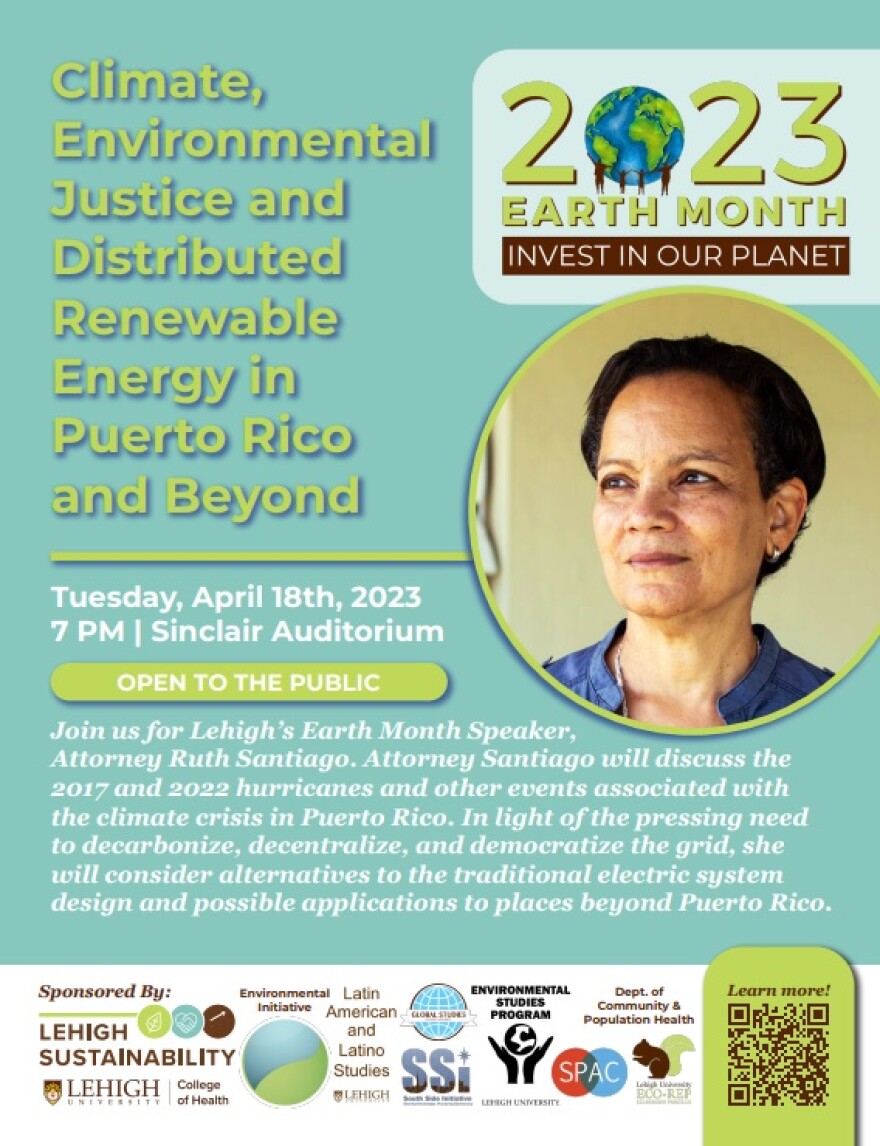BETHLEHEM, Pa. — Ruth Santiago’s passion for environmental advocacy started in the Lehigh Valley.
- Ruth Santiago, an environmental activist and attorney, is speaking at Lehigh University 7 p.m. April 18
- She credits her time growing up in Bethlehem as the catalyst for her environmental work
- Her talk will focus on transforming electric systems amid climate change
“The open space, and the nature and I remember the sleigh riding on Fountain Hill, and just the diverse neighborhood — wonderful neighbors,” said Santiago, an attorney and environmental activist in Puerto Rico.
All of that was my first real encounter with nature and, I think, planted the seed for my environmental work.Ruth Santiago
“One neighbor in particular taught me how to plant flowers, and so I have really fond memories of living in Bethlehem when I was growing up.”
“... All of that was my first real encounter with nature and, I think, planted the seed for my environmental work.”
And that seed has grown.
After graduating from Lehigh University in 1980 with a double major in economics and Spanish literature, Santiago earned her law degree from Columbia University. In the decades since, she’s fought against environmental injustice in Puerto Rico, her work garnering her a spot on the White House Environmental Justice Advisory Council.
For the first time since before the COVID-19 pandemic, Santiago is returning to the Valley this month to speak with students and residents about climate change and the need for alternative electric systems as the university's Earth Month speaker. The event is slated for 7 p.m. April 18 at Lehigh’s Sinclair Auditorium. The event is free and open to the public.

‘We've had devastation’
Puerto Rico is a prime example for extreme weather events related to climate change, Santiago said.
“We've had devastation from these more intense hurricanes again and again,” she said. “Especially hurricane Maria — the whole electrical system was knocked out. And then just this past fall, with Hurricane Fiona, it happened again, but this time, it was just a Category 1 hurricane.”
Hurricane Maria in September 2017 struck Puerto Rico as a Category 4 storm, damaging or destroying hundreds of thousands of homes and causing an estimated 2,975 deaths after razing the island’s power grid. Hurricane Fiona on Sept. 18 slammed into the territory’s southwest region as a Category 1 storm. Weeks after, more than 270,000 people out of 1.47 million were without power and more than 100,000 residents out of 1.2 million without water service, according to an Associated Press report.
During her event at Lehigh, Santiago will speak about electrical system design, she said, “and how to mitigate, to some extent, or adapt to what is happening and, of course, transform electric systems in a way that hopefully will minimize the worst aspects of the climate crisis.”
Environmental equity
Santiago moved to Salinas, Puerto Rico, in 1989, she said. It hosts the largest electrical facility in the territory.
“This power plant, and others throughout Puerto Rico and throughout the world, have impacts,” she said. “Their operations have impacts on the natural environment, the communities that are nearby — there's this linkage, energy-water linkage, that people don't think about too much.
"We often concentrate on what comes out of the stack in the air pollution, emissions from power plants, but power plants also use a lot of water, both freshwater and in this case, also the seawater, and have adverse impacts in that sense.”
In Salinas, residents depend on the ground water for drinking, she explained. But they face competition from the electrical plant.
“They extract water from the same source, that was known as the South Coast aquifer, and sometimes, during droughts, with all these extreme weather events, there is water rationing,” she said. “So, people are sometimes not able to have running water for two or three days in a week for the summer months.”
Her work is not only about protecting the environment through transforming electrical systems, Santiago said, but also about equity.
“One example is that we're seeing high-income people in Puerto Rico installing rooftop solar systems and battery energy and coupling those with capacitor energy storage systems, but low-income people or median-income people can't afford to access that type of life-saving, resilient energy supply,” she said. “This is very much also an issue about how that transformation impacts social justice.”
For more information, go to https://sustainability.lehigh.edu/earth-month.


